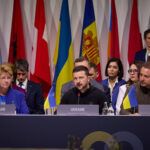What role will America’s European allies play after the Biden-Putin summit?
By Ivanka Barzashka | June 18, 2021

This article is part of a collection of expert commentaries on the Biden-Putin summit held in Geneva on June 16, 2021. To read other articles in the collection, click here.
President Joe Biden held a summit with President Vladimir Putin on Wednesday. In a joint statement, the two leaders confirmed their intent to ensure “predictability in the strategic sphere, reducing the risk of armed conflicts and the threat of nuclear war.” The United States and Russia agreed to “embark together on an integrated bilateral Strategic Stability Dialogue.”
Biden explained this dialogue aims to “try to set up a mechanism” for dealing with strategic stability issues and address the “need to have some basic rules of the road that we can all abide by.” Putin further elaborated that for the “situation to be stable, we need agreed rules, a set of conduct across all areas, strategic stability, cyber security, regional conflicts. I have an impression that we can agree.”
While some strategic stability issues—like further cuts to strategic nuclear arsenals—mainly concern US-Russian relations, most areas of concern—from non-strategic nuclear weapons to cyberattacks—greatly affect European security. Yet the White House did not mention of any substantive role for America’s European allies in this future diplomatic process.
This omission comes as a surprise, particularly when the United States is working hard to assure allies of its security guarantees. Biden’s meeting with Putin followed a NATO summit at which allies highlighted Russia’s “aggressive posture of strategic intimidation” and “aggressive actions constitute a threat to Euro-Atlantic security,” and resolved to work “closely together to address all the threats and challenges posed by Russia.”
NATO Secretary General Jens Stoltenberg said, “the most important message” the alliance has sent to Russia is that “they are not able to divide us.” Yet, so far, Putin is succeeding in isolating Europeans from future discussions about their own security. He told reporters that, while Biden had courtesy meetings with European leaders, the United States will be “promoting interests necessary and important for themselves.”
Biden’s trip to Europe this week aimed to repair America’s global leadership status after a period of eroding trust in US commitments to allies. However, the US-Russia summit raises questions: Does Biden intend to work together with NATO allies to shape the rules of the European security order? Or will he decide these rules bilaterally with Putin? As Biden told reporters, “The proof of the pudding is in the eating.”
This article is part of a collection of expert commentaries on the Biden-Putin summit held in Geneva on June 16, 2021. To read other articles in the collection, click here.
Together, we make the world safer.
The Bulletin elevates expert voices above the noise. But as an independent nonprofit organization, our operations depend on the support of readers like you. Help us continue to deliver quality journalism that holds leaders accountable. Your support of our work at any level is important. In return, we promise our coverage will be understandable, influential, vigilant, solution-oriented, and fair-minded. Together we can make a difference.
Keywords: Biden, Putin, Russia, United States, nuclear weapons
Topics: Analysis, Nuclear Risk, Nuclear Weapons, Opinion















